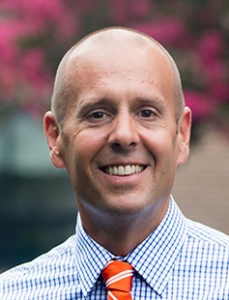This is the sixth in a series created by a partnership between Baptist News Global and the Campbell University Center for Church and Community. Each month’s columns explore one of the seven types of capital described in the Community Capitals Framework developed by Flora, Flora and Gasteyer.
A popular pay-what-you-can café in downtown Raleigh boasts a Community Table where guests are invited to sit together for a meal or coffee. It harkens to many European cafés where the seating options are community tables, rather than the isolating nature of booths in many American restaurants.
The community table invites interaction, exchanges of ideas, new friendships and shared stories. The very idea of a common table sparks theological imagery about the invitation to the Communion table, a place of inclusion, forgiveness and calling.
“The culture of a shared table is one to which people of faith should strive.”
The culture of a shared table is one to which people of faith should strive. Sadly, when it comes to power and political capital in many communities, the table is not a shared one.
Where political power lives
Flora, Flora and Gasteyer describe political capital as existing within a “community power structure” that can be interrogated “to determine the degree to which it is widely participatory or more concentrated.” As the authors note, local community power is not always obvious: “Individuals who hold formal positions of authority may or may not actually set the agenda.”
Sociologist Robert Wuthnow describes similar findings with respect to community leadership and politics in his book Small-Town America. Wuthnow describes the informal authority in small communities that “accrues to wealthy residents, philanthropists, clergy and residents who volunteer for important committees.” As such, he describes community leadership as “harder to define and more difficult to evaluate than leadership in formal organizations” but “no less significant” when it comes to decision-making in small towns.
“When issues of power seep into community decision-making, it tends to be a short hop to using that capital to maintain power and influence.”
When issues of power seep into community decision-making, it tends to be a short hop to using that capital to maintain power and influence. As Flora, Flora and Gasteyer offer, “Political capital is a group’s ability to influence the distribution of resources within a social unit, including helping set the agenda of what resources are available. Generally, political capital reflects the dominant cultural capital: there is a tendency to support the status quo.”
Political capital mixed with social capital
This use of political capital also is rooted in another community capital we discussed in a recent article: bonding social capital. Flora et al. continued by writing, “In many rural communities, high levels of bonding social capital reinforce the current situation and discourage groups with different ideas and agendas from coming forward to offer alternatives.” When there are groups missing from active participation in building the community because of the absence of bridging social capital, a system is perpetuated that becomes more about power and status quo than true community building. Here, a lack of bridging social capital can create and bolster an exclusionary form of political capital.
As stated earlier, when power is used to protect the status quo, community members on the margins often are excluded from the table. It isn’t only that they are not invited, it is assumed the table belongs to one group and not another. For those working from a place of privilege, the table is not ours to invite others to, as if we are not there merely as guests ourselves.
“When power is used to protect the status quo, community members on the margins often are excluded from the table.”
At many of our churches, the call to the Communion table is a reminder that “all are welcome.” This should not just be a theological exercise. It is a kingdom-building activity. The minister behind the table does not own that table, yet stewards it by making sure all are invited and welcomed.
It is our responsibility as people of faith to put power under the microscope, especially through the lenses of cultural and social capital. Do we recognize where power exists in both helpful and harmful ways? Do we know what power looks like in our own contexts and communities? How do we leverage it to increase political capital in our communities, geared toward building bigger tables that are more inclusive?
For much of modern history, the assumption has been that those with the most money also have the most power. Surely their financial success is illustrative of how intelligent and hard-working they are. We know this is a false equivalency, but as a result, these voices often have led communities through technical assistance models of community development that tend not to involve significant community engagement and input. These also tend to be deficit-based development models and create a system where groups are competing for finite resources.
Benefit of appreciative inquiry
A better model of community development described by Flora et al. is the appreciative inquiry approach that “focuses on strengths and what works rather than on problems or needs.” According to the authors, appreciative inquiry “engages community partners in conversations to learn about the factors that contribute to success.”
In his analysis of community engagement and leadership in small towns, Wuthnow says, “The innovations that work best are those that build on existing resources.” As an asset-based approach, appreciative inquiry makes use of the community capital as a framework for dialogue and better understanding. It acknowledges political and power differences while appreciating cultural capital as part of community development. Essentially it creates and relies on bridging social capital in the community to identify, share and grow resources.
“Appreciative inquiry makes use of the community capitals as a framework for dialogue and better understanding.”
Churches are key participants in this work, either through acceptance of the status quo that benefits a group of privilege, or by seeking to build the kingdom.
As discussed in a previous article about cultural capital, the church has significant influence on the well-being of a community. Leveraging cultural capital through increased bridging social capital will increase political capital. It does so by making sure the conversation is engaging the positive aspects of power more so than its destructive forces.
Examining the cultural assets, the human assets and the diversity of community is but a small part of this work. Discovering the full assets of the broader community creates respect and trust, which Wuthnow notes as particularly important factors in small-town community leadership. Respect is especially important as we come together in dialogue at the common public table.
The gospel is political
As part of this process, predominantly white churches need to do some self-reckoning of their own loss of political power. Where attendance is down, and there is an absence of connection to other capitals, this suggests a loss of political capital too. As a result, is the church aware of when it acts to preserve a status quo that favors it? How can the church lean into ways of creating community flourishing by expanding its own political capital?
Popular wisdom suggests not mixing politics and religion at the dinner table, but let’s be honest, the gospel is political. Perhaps part of the divisiveness of our community is the inability to recognize this connection.
“Jesus was not crucified for being a nice guy.”
Jesus was not crucified for being a nice guy, but rather was seen as a threat to the religious and political powers of the day. By giving voice to the powerless through challenging the laws that protected the status quo, Jesus was a threat to both the Jewish and Roman authorities.
How can your congregation exercise political capital to increase flourishing in the community? Participating as a congregation in an appreciative inquiry process helps recognize the cultural capital the church possesses for naming norms and values. Expanding the conversation with other worshipping communities, nonprofit agencies and business leaders can lead to improved well-being of the community, not through a list of projects to accomplish, but through shared leadership, shared power and shared political capital.
What about the marginalized?
You may be wrestling with some version of a question we are as well: “What about the marginalized who lack access to political capital?” While we do not pretend to know the answer, the last year has shown the power of resistance, where many community groups, activists, artists and even athletes have latched onto and leveraged their cultural capital to make change. They have increased their political capital by demonstrating their larger social and cultural capital.
Congregations throughout the country have done the same, while others have used their political capital to exclude. For guidance on the importance of our role, we return to the Communion table imagery. Are we a people expanding the kingdom through inclusion and welcoming, or are we attempting to increase our own power through exclusion?
Shared norms, not our personal norms, must be adopted to increase community flourishing. Even as Jesus offered the blessing to the disciples, they argued about who among them was the greatest. Hopefully, the church today models itself after the church the disciples built when they stopped seeking power and started preaching the very things Jesus taught them.
Throughout Acts, the church flourishes as resources are shared and the community builds toward shared norms of care for the poor, widows and orphans. Throughout his letters, Paul routinely uses images of the body of Christ rejoicing and grieving as one. May our communities be filled with churches and followers of Christ, seeking to expand the table to which we are all invited.
Ideas for action
How can your church engage in the political capital of the community?
- Map the local community power structure, indicating individuals, groups and organizations that impact town politics, working to understand how participatory political processes and decision-making is in your town. Seek ways to get involved in these processes.
- Participate in an appreciative inquiry process.
- Engage in listening sessions with various voices in the community about how power operates in your context.
- Seek to partner with other worshipping communities to create a community table, covenanting that no one claims ownership nor power over others.

Brian Foreman

Justin Nelson
Brian Foreman serves as executive director of the Center for Church and Community at Campbell University. Justin J. Nelson serves as assistant professor of sociology.
Previous articles in this series:
On social capital, churches often do one part well and one part not well
Let’s begin a conversation about the church in rural areas
The importance of natural capital for the rural church
Rural churches need to understand the cultural capital of their communities
Understanding human capital makes volunteer recruitment easier


